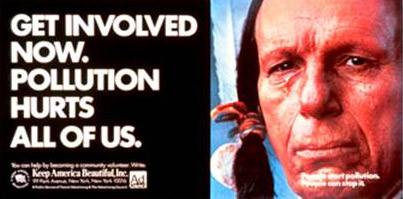I say Call to Conscience, you say Guilt Trip...
A call to conscience depends on raising awareness of a problem in the hopes that people will voluntarily change their behavior. A famous example of a call to conscience was a commercial that ran in the 1970s:

In the televised public service announcement (psa), a deep-voiced narrator intones “people start pollution, people can stop it." The ad is clearly meant to elicit an emotional response in the viewer. Who would want to be the jerk responsible for polluting the environment? (You can see the entire 59 second spot here).
A call to conscience can be very useful...
- If the group involved is small or close-knit,
- and if people in the group care about what other people think about them,
- and if the "call" is to do something that's not too hard.
So does the "crying Indian" psa fit this description? Well, certainly "don't litter" is a fairly easy call to heed (at least if we're talking about throwing fast food wrappers on the ground -- other kinds of waste are harder to dispose of properly). On the other hand, it was broadcast to the entire nation -- in other words, a huge mass of people with relatively few ties. And in fact, later research has suggested that the ad was not terribly effective because it suggested that "everyone litters" -- and thus by extension that littering is not a problem that the individual can do much about.
Try it yourself
When is a call to conscience likely to work? Compare these 2 situations – which one is more likely to be fixed by a call to conscience?
Copyright University of Maryland, 2007
You may link to this site for educational purposes.
Please do not copy without permission
requests/questions/feedback email: mathbench@umd.edu